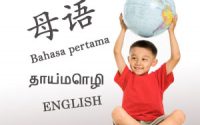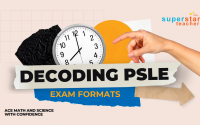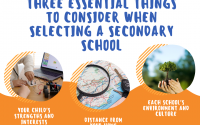Subject-Based Banding for Secondary Schools
By now, you probably would have known or heard about the Subject-Based Banding (SBB) system that will soon replace the current streaming system in secondary schools. If not, well, here’s the lowdown on it.
The current system
Secondary school students are allocated to three different streams based on their PSLE scores. They can only take on subjects at levels that correspond to the particular stream they are in.
- Express: 4-year course leading to the “O” Level examinations
- Normal (Academic): 5-year course leading to the “N” and “O” Level examinations
- Normal (Technical): 4-year course leading to the “N” Level examinations and admission to ITEs
♦
What is Subject-Based Banding (SBB)?
“One secondary school education, many subject bands”

The current streaming system was initially implemented to curb drop-out rates when Singapore was still a developing nation. With SBB, education becomes even more tailored to the individual. Instead of studying the whole curriculum at a particular level (in the case of streaming), students have the option to take certain subjects at a higher or lower level based on their abilities and interests. In a way, it allows students to focus more on their strengths and gain mastery in subjects that they have shown to have a flair for.
Aspects of SBB have already been introduced in some schools, where students in the Normal (Academic) and Normal (Technical) streams are allowed to take certain higher-level subjects (core subjects: languages, mathematics and science) according to their PSLE performance and this enables them to learn at a better-suited pace. In addition, having students of different streams attend classes together helps in breaking down invisible walls between them and in forging friendships.
♦
Timeline

2020-2023: Implementation
SBB will be introduced to 28 pilot schools starting next year, with the complete implementation of this system nation-wide by 2024. Schools will attempt to group students from different streams into the same form classes. For instance, students allocated to the same form classes may have common subjects or co-curricular activities (CCAs). Besides the core subjects, Normal (Academic) and Normal (Technical) students are also able to take Humanities subjects at advanced levels.
The following is the list of the 28 pilot schools-
1. Ang Mo Kio Secondary School
2. Assumption English School
3. Bedok Green Secondary School
4. Bowen Secondary School
5. Clementi Town Secondary School
6. Deyi Secondary School
7. Edgefield Secondary School
8. Evergreen Secondary School
9. Gan Eng Seng School
10. Greendale Secondary School
11. Jurong Secondary School
12. Jurong West Secondary School
13. Mayflower Secondary School
14. Montfort Secondary School
15. Paya Lebar Methodist Girls’ School (Sec)
16. Pei Hwa Secondary School
17. Ping Yi Secondary School
18. Queenstown Secondary School
19. Riverside Secondary School
20. St. Andrew’s Secondary School
21. St. Anthony’s Canossian Secondary School
22. St. Patrick’s School
23. Swiss Cottage Secondary School
24. Temasek Secondary School
25. West Spring Secondary School
26. Whitley Secondary School
27. Yuying Secondary School
28. Zhenghua Secondary School
2024: Full-SBB
By 2024, the streaming system will be completely abolished. Upon entry into the secondary school, students will be assigned a combination of subjects at G1/2/3 levels based on their PSLE results. Subsequently, these subject levels can change according to their interests and academic performance in school.
2027: Common Examination
In 2027, the first cohort of Secondary 4 students will sit for a common national examination that will replace the current “O” and “N” Level examinations. They will receive a common certificate, which will be used for entry into the various tertiary institutions (Junior Colleges, Polytechnics and ITEs). The whole secondary education will take place over 4 years, as compared to the current 4-5 years.
Note: SBB does not apply to students in the Integrated Programme (IP) and the International Baccalaureate (IB) streams.
♦
Bottom line
We can view the introduction of SBB as a step towards addressing the insidious impact of streaming, which has become associated with elitism, prejudice and the stigmatisation of students. Conversely, some may argue that the three subject levels are somewhat akin to the current streams and that students may still feel demoralised for failing to take subjects at the G3 level.
The key takeaway, though, is that this initiative allows students from different backgrounds to interact and bond together. This will (hopefully!) overcome the current barriers and divisions between students of different streams. They can then grow up to become well-adjusted individuals accustomed to interacting with people of diverse backgrounds, especially in Singapore’s heterogeneous society.
In this case, it is certainly a means to an end, rather than an end in itself.




